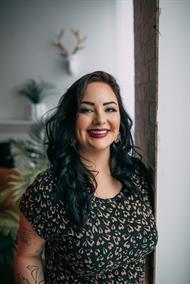Reclaiming our voice: Indigenous Patient Experience Lead aims to bring Indigenous experience to the forefront of conversation

Meet Cassie Michell, the new Indigenous patient experience and partnerships lead at BC Mental Health and Substance Use Services.
In November 2020, the In Plain Sight report highlighted the breadth and depth of Indigenous-specific racism and discrimination in B.C.'s health care system and outlined recommendations to advance Indigenous cultural safety. BCMHSUS recognized the immediate need for an Indigenous Cultural Safety Action Plan.
Part of this plan to combat anti-Indigenous racism involves prioritizing the hiring of Indigenous leaders. Cassie Michell, the new head of Indigenous patient experience and partnerships at BCMHSUS, is one such leader.

A member of Kanaka Bar, part of Nlaka'pamux Nation, Cassie has worked as an LPN in B.C. for over 12 years. She now lives and works in Tk'emlúps te Secwe̓pemc, colonially known as Kamloops. Cassie is the first generation in her family to have not attended a Residential 'school' and the second generation not to have experienced an Indian Hospital—institutions run by the Canadian government from the 1930s to 1980s to segregate Indigenous children and adults from non-Indigenous people.
In both her personal and professional life, Cassie has seen first-hand the need for Indigenous voices to be welcomed.
"A few years ago, my Dad got very sick," said Cassie. "Up to that point, I had never recognized his fear of health. It was a wake up call for me to see that my people were afraid of asking for help or speaking up—there is a fear of rejection or being called a liar.
Dad is a survivor of St. George's Indian Residential School, so I have seen the impacts of colonialism in my own family. I wanted to help my community by fixing the system so that Indigenous People would no longer be scared of getting help."
Cassie's overarching goal is to bring Indigenous voices to the forefront of conversations, especially around mental health and substance use. To do this, she says that we must start from a place of common understanding.
"BCMHSUS recognized the need to create Indigenous leadership positions that will enable change at transformative level of the organization." - Cassie Michell
"To date, society saw just one perspective of history, one that misrepresented Indigenous experiences," said Cassie. "The reality is that generations of Canadians have been mistaught and are inheriting a false narrative. Before we can move forward, we must acknowledge and understand our shared history. We are at a pivotal point where we can no longer deny or ignore the lived and living reality of Indigenous Peoples in Canada. We each hold immense opportunity as well as the responsibility to unlearn and learn the true histories of Indigenous Peoples."
Action planning for a culturally-safe future
In her role at BCMHSUS, Cassie will be refining the Indigenous Cultural Safety Action Plan and will work with leaders as they implement the recommendations. This plan was created in collaboration and partnership of PHSA Indigenous Health and has been endorsed by BCMHSUS Executive Leadership with a commitment to advance the recommendations throughout the organization. It identifies priority initiatives such as capacity development, education and awareness, hiring goals and meaningful engagement with Indigenous People.
"I have seen how transformative it can be when people receive culturally safe care, when they have access to ceremony, Elders or traditional ways," said Cassie.
"Often, we get caught up in the idea that Indigenous People are unwell, struggling with substance use. We do not get to celebrate all the wonderful aspects of our communities as much as we should—the connectivity, how we come together to support people, our deep relationships. Providing opportunities for others to witness and experience our strengths as Indigenous Peoples, our traditional ways of being and the incorporation of traditional healing practices are essential in moving towards strength based wellness of Indigenous Peoples."
The Action Plan outlines specific ways to embed culturally safe at all levels and BCMHSUS has begun to implement some of the actions:
- Organizational development that includes policies and frameworks that are embedded throughout the organization
- Human Resources that commit to the recruitment, development and retention of Indigenous leaders and care providers
- Indigenous Cultural Safety and Humility training for staff
- Health literacy that enables individuals to make informed decisions about their health and treatment
- Engagement of Indigenous Peoples with living and lived experience of mental health and substance use
- Delivering care that is Culturally safe
- Measuring and evaluating the effectiveness of programs, policies
- Research that is innovative, collaborative with Indigenous partners and is identified by Indigenous Peoples/Researchers and grounded in self-determination and strength based

"Indigenous Health continues to prioritize the investment of Indigenous leadership positions and programs in PHSA and to create working and learning environments where they can thrive and where Indigeneity and Indigenous knowledge are valued,"
said Rose Melnyk, Indigenous Health Manager, Provincial Indigenous Cultural Safety Program, PHSA. "BCMHSUS' commitment and investment in an Indigenous leadership position showcases that they listened and raised the opportunity, voice and support for an Indigenous thought leader to be part of leadership discussions and decision-making processes."
Cassie is excited to walk alongside BCMHSUS in the journey towards Cultural Safety and Humility for those working in the organization and those that accessing services.